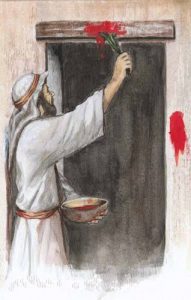
The Passover by Subject – Christ our Passover
The Passover is the first in our series of JND on Selected Subjects
- The Passover and the Feast of Unleavened Bread in the Old Testament – in the Wilderness, under Josiah and Hezekiah
- The Passover in the New Testament – ‘Christ our Passover’
- Original Passover – God’s Commandments
- The Historical Keeping of the Passover
- The Feast of Unleavened Bread
- The Firstborn Claimed
- The Timing of the Passover at the End of the Lord’s Pathway
- The Last Supper
- Christ our Passover (This page)
Notes from Darby’s Writings |
Reference |
| Discipline follows; for Christ had been offered up as the Paschal Lamb, and they were to keep the feast without leaven, keeping themselves from the old leaven; in order that they might be in fact, what they were before God an unleavened lump | JND Synopsis 1 Corinthians 5
|
| God said, “When I see the blood, I will pass over you.” The blood of Christ is ever before the eye of God. He never fogets it. If God does not ever forget the blood of Christ shed once for ever, He does not wish us to forget it. The Lord Jesus in His boundless grace wishes us to think of Him, to remember Him. Precious manifestation of love for us, that the Saviour should delight in our remembrance of Him, and that He has left us a touching memorial of Himself and His love. Jesus wishes us to think of Him, because He loves us! The Lord said, ‘This is my body … do this in remembrance of me’ (See (Matt 26:26, Mark 14:22, Luke 22:19, 1 Cor 11:24). In the supper we shew forth His death till He comes.
Lastly, the Lord gives to His disciples of the fruit of the vine to drink; and it is called this after that the Lord had said in verse 24, ‘This is my blood of the new covenant.’ It is quite clear that when he says, ‘I will drink no more of it’ He speaks of wine in its natural sense.
|
JND Collected Writings Volume 24 (Expository 3) p319 on Mark 14
|
| God’s righteousness as Judge is connected with blood, as in Romans 3 and also in the Passover. No man could ever plead a part in the second dealing of righteousness save Christ Himself, for all are sinners; Christ, even as a Man down here, could be accepted as perfectly agreeable to God. But then Christianity, and even Judaism in its figures, goes a great deal further — for grace reigns through righteousness, and sinners were to be justified or accounted righteous. | Notes & Comments vol. 2 p 68
ATONEMENT |
| The blood on the lintel and doorposts having met the sin, now full deliverance is wrought by the death and resurrection of Christ. Satan’s power, judgment which shut them in, were gone and secured Israel for ever from them. It was finished, done, and they were delivered and with God. | Notes & Comments vol. 2 p 134
THE RED SEA AND JORDAN |
| There were three great feasts when all Israel had to go up to Jerusalem, the Passover, Pentecost or Feast of Weeks, and the Tabernacles. The true Passover has been sacrificed, but the great gathering of the Feast of Tabernacles has yet to come; people will then own Christ to be their Passover, who will not have done so hitherto. That however, is still future. | Notes & Jottings p 158
LECTURE AT ROCHDALE
|
| The Passover was first held when Israel was coming out of Egypt, and for seven days they were to eat unleavened bread.
In the Passover, man is a judged and condemned race. But the pride of man is such that he refuses this, and seeks to restore himself as he is. People claim that Christ come into the condition of the children of Adam, as if it were to raise up men as men. This is all false. It is a totally new place altogether into which Christ has entered. It is all over with the world, and God has proved His righteousness in setting Christ at His own right hand.
|
Notes & Jottings p 160
LECTURE AT ROCHDALE
|

